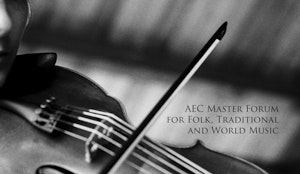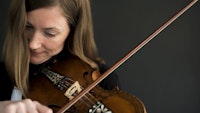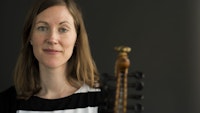What can such a forum do for the European community of folk, traditional and world music?
A New Forum for European Students in Folk, Traditional and World Music

"One of the most important parts of an artistic study program is meeting other students and creating a long-lasting professional network", says Zosha Warpeha, who, together with Isa Holmgren, are the initiators of the forum.
A need for sharing and networking
Coming out of a year without the regular cross-genre projects and interdisciplinary work of a typical study year, the folk music master students at the Norwegian Academy experienced a growing need for meeting people, sharing ideas and getting inspiration.
"In this last year, we haven’t had opportunities to meet other master students or present our work and discuss it with peers, so we feel like we are missing out on a large part of our study program. Through this forum, we hope to do a little bit of networking, a little bit of sharing and hopefully be inspired by each other" (Zosha Warpeha)
Zosha is originally from Minnesota in the USA, where she was exposed to Swedish and Norwegian folk music at a young age, as this is a region with a high number of Scandinavian immigrants. Her music studies later took her to New York, where she focused on jazz and improvised music before re-discovering the Hardanger fiddle and Norwegian folk music. This brought her to Norway for an exchange stay extended into a full master study, which she will complete this summer.
Seeking new inspiration
Isa Holmgren, the other initiative-taker of the forum, is originally from Sweden, where she completed a Bachelor’s degree in Swedish folk music in Gothenburg. She is now doing a Master's project on folk music and folk dance music from the Norwegian-Swedish border.
It might seem like a paradox that two students studying Norwegian folk music at a Norwegian conservatoire have their roots in countries and musical cultures outside Norway. Still, according to Unni Løvlid, the folk music department leader at the Norwegian Academy of Music, it is quite typical that folk musicians seek out new inspiration and opportunities.
I think this is something we will see a lot more in the future. As folk musicians, we need to keep our curiosity, an open mind and be in constant dialogue and reflection with the community we’re a part of. Our society is multicultural, and that should be reflected also in our studies.
, leader of the folk music department at the Norwegian Academy of Music
An open and informal network
To the Master students, the forum must be kept informal, with opportunities for various formats of presentations and submissions. Some students might be doing thesis-based Master's degrees, while others may have a more substantial artistic component. “When you’re doing an artistic project, you might wish to present your research in a different way than you would present a thesis-based Master’s degree”, Zosha points out, and continues by stating how important it is that we do not forget that “we are musicians, playing music.”
Read about the forum:
"Even the idea of having folk music in the conservatory is weird because this music exists outside of the conservatory. It exists in informal settings, at dances, concerts and parties, and there has to be a way of combining that natural and organic way of teaching and performing music with what we do at the university level". (Zosha Warpeha)
Therefore, at the forum, they hope to see all kinds of presentations that make sense for the projects that master students around Europe are doing. Zosha and Isa hope that the forum will include performances as well as theoretical presentations. In the future, when the situation again allows for physical meetings, the students picture the forum as an event over several days, including presentations, concerts and playing together. This first event on 25 May 2021 will hopefully be only the beginning of a long-lasting project.
For the people attending, the aim is that they get a chance to get to know other master students, get inspired by their projects, and learn about how they can use the resources that a master degree provides.
Master's student
Connecting students studying folk, traditional and world music
The forum is primarily for Master students in European higher music education institutions studying folk, traditional or world music. Bachelor students and PhD-students belonging to these genres are also welcome as listeners. For Bachelor students, it might be inspiring to hear of the opportunities that exist at the Master’s level.
"I think many Bachelor students are scared about the idea of a Master’s degree. I was terrified about the idea of it; I didn’t plan to do one until I got here, and then I realised that a Master's degree doesn’t have to be a scary academic thing. I realised it was accessible to me as a performer and an improviser, so I’d like to show that to other students so they too can consider ways of building a two-year artistic project and whether or not a Master’s study is the right fit for them". (Zosha Warpeha)
But what criteria will be used for selecting presentations for the first AEC Master Forum for folk, traditional and world music? The students suggest that the most important thing is to have equal representation between countries, institutions, topics, and types of projects. After these criteria are met, presentation slots will be filled on a first-come, first-served basis.
I believe that building a larger community is very wise.
.
Strengthening folk music as a field
Folk, traditional and world music are still relatively young programmes in the history of higher music education. This forum's broader goal is to strengthen folk, traditional and world music as a field of its own within higher music education.
"The folk music department at the Norwegian Academy was founded in 1995, and we are still only in the first phases of building the programme on our premises. To do that, we rely on new generations of well-educated teachers and musicians that can help us improve and move ahead. That’s why we need more students at both the master’s level and the PhD-level". (Unni Løvlid)
Moreover, it is fascinating how significantly different these study programmes are around Europe, Unni Løvlid points out. Students should be exposed to these variations and nuances at an early stage of their studies to see opportunities for their artistic projects, collaboration partners or opportunities for exchange stays.
For the field as a whole, visibility, networks, and collaborations are essential, Unni argues. AEC is the organisation connecting all European institutions for higher music education. Currently, folk, traditional and world music is organised under the platform of pop and jazz. However, to build and strengthen the community, it would be a huge benefit, Løvlid emphasises, if folk, traditional and world music was organised as a separate platform.
"Then we could meet and invite experts on baroque music, experts on contemporary music etc., but then they would come to our community and contribute to our discussions. We want to be part of the structure. We want to be invited to play. We want to be taken seriously as a field. But the request for such a platform needs to come from the community itself". (Unni Løvlid)
At the end of the conversation with Unni Løvlid, I asked her what she would consider as the criteria of success for this first master forum:
If we have ten people joining, I will be super happy. I also hope we manage to keep it informal. I hope the students will inspire each other, that we can get to know one another, get to listen to each other, visit the ideas and visions of our peers, and just learn about each other. Then, this can be the starting point of a long-lasting project.
.

